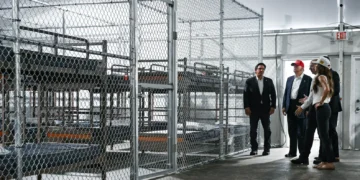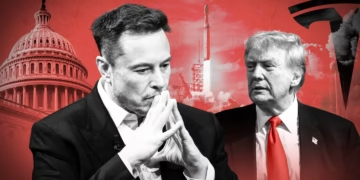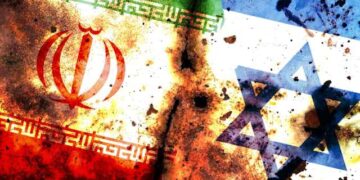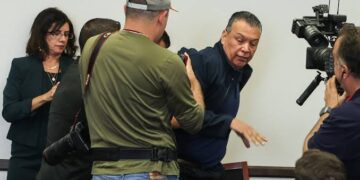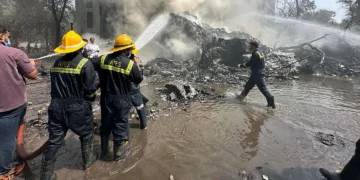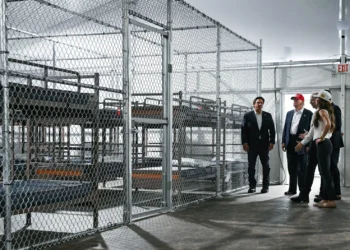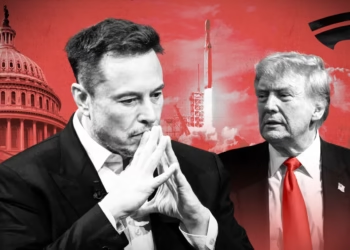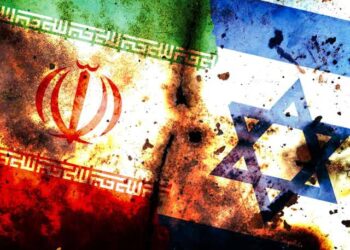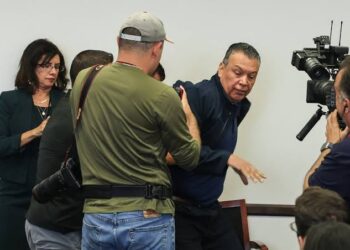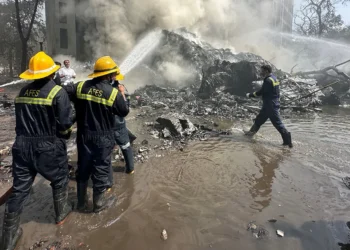The arrest of Ras Baraka, the mayor of Newark, during a recent protest at the Delaney Hall ICE detention center has sparked significant attention. The protest was against the detention conditions at the facility.

This event has raised questions about its potential impact on Baraka’s campaign for governor of New Jersey in 2025. As a prominent figure in New Jersey politics, his actions are under scrutiny.
Key Takeaways
- The arrest occurred during a protest against ICE detention conditions.
- RAs Baraka’s actions have garnered significant media attention.
- The incident may influence the NJ governor race 2025.
- Supporters and critics are weighing in on the implications.
- The protest highlights ongoing debates about immigration policies.
Newark Mayor Ras Baraka Arrested for Alleged Trespass at New Jersey ICE Detention Facility
Newark Mayor Ras Baraka found himself at the center of controversy after being arrested for allegedly trespassing at a New Jersey ICE detention facility. This incident has sparked a heated debate about immigration policies and the role of elected officials in protesting against them.

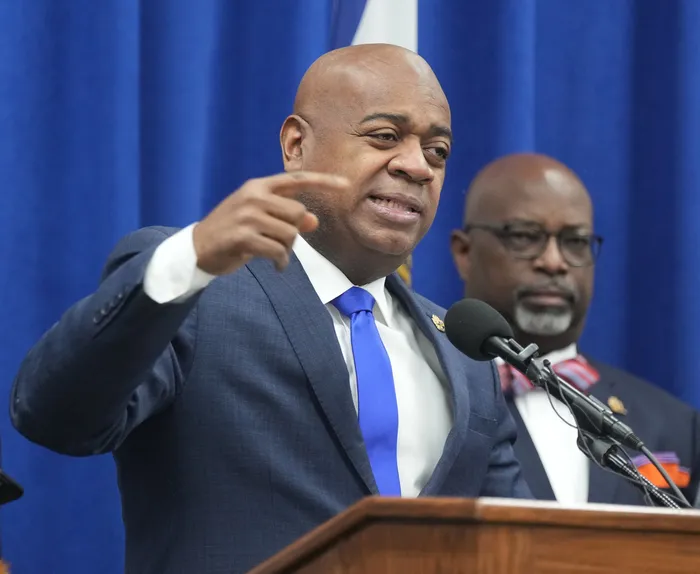

Details of the Arrest Incident
The arrest took place during a protest at the ICE detention center, where Mayor Baraka and other demonstrators were voicing their opposition to the detention conditions and immigration policies. According to reports, Baraka was arrested after allegedly entering the facility without authorization.
Acting U.S. Attorney for the District of New Jersey, Alina Habba, stated that Mayor Baraka “committed trespass and ignored multiple warnings from Homeland Security Investigations.” This statement underscores the seriousness of the allegations against the mayor.
Official Statements from Authorities
The official response to the arrest has been firm, with authorities emphasizing that the law applies to everyone, including public figures. The incident has highlighted the tension between law enforcement and political activists, particularly in cases involving sensitive issues like immigration.
In response to the arrest, supporters of Mayor Baraka have argued that his actions were a necessary form of protest against unjust policies. This incident is likely to have implications for his ongoing gubernatorial campaign, as it brings attention to his stance on immigration and his willingness to take a stand.
The Protest at Delaney Hall: Chronology of Events
The reopening of the Delaney Hall ICE detention center sparked a heated protest. The demonstration was triggered by concerns over the facility’s operational status and allegations that it was operating without valid permits.
What Triggered the Demonstration
The protest was largely driven by the community’s opposition to the ICE detention center’s reopening. Critics, including Newark Mayor Ras Baraka, argued that the facility lacked the necessary permits to operate. Concerns over detainee treatment and facility conditions were also central to the protest.
The Reported Scuffle Outside the Facility
A scuffle was reported outside the Delaney Hall ICE detention center during the protest. Eyewitnesses described the scene as chaotic, with protesters attempting to breach the facility’s perimeter. The situation escalated until law enforcement intervened.
Eyewitness Accounts
Eyewitnesses provided firsthand accounts of the events, describing the tense atmosphere and the moment when the scuffle broke out. One witness stated, “The protesters were determined to make their voices heard, and the situation got out of hand quickly.”
“The protesters were met with resistance from law enforcement, leading to a confrontation that was captured on video.”
Protest witness
Video Evidence and Media Coverage
Video footage of the protest and the subsequent scuffle was widely circulated in the media. The coverage highlighted the intensity of the confrontation and the determination of the protesters.
The media coverage not only brought attention to the protest but also to the underlying issues concerning the Delaney Hall ICE detention center. The event underscored the community’s deep-seated concerns regarding immigration policies and detention practices.
Congressional Involvement: New Jersey Democrats at the Scene
Congressional involvement took center stage when New Jersey Democrats attempted to access the ICE detention center. This move was part of a larger protest against the detention conditions at the facility.
Attempt to Access the Facility
Three U.S. House Democrats from New Jersey, including Representatives Bonnie Watson-Coleman, LaMonica McIver, and Rob Menendez, were involved in the incident. They claimed to be conducting an “oversight visit” to the ICE detention facility. The representatives sought to gain access to the facility, highlighting their concern over the detention conditions and treatment of detainees.

Claims of Conducting an “Oversight Visit”
The Democrats asserted that their visit was within their congressional oversight authority. They argued that as elected representatives, they had the right and duty to oversee the operations of federal agencies, including ICE detention centers.
Legal Authority for Congressional Oversight
Congressional oversight is a fundamental aspect of the U.S. system of checks and balances. It allows Congress to monitor the executive branch and its agencies. The representatives cited this authority as the legal basis for their actions, stating that it was their duty to ensure that ICE was operating within the bounds of the law.
ICE’s Response to the Representatives
ICE officials responded to the representatives’ attempt to access the facility by denying them entry. The agency cited security protocols and operational concerns as reasons for their decision. This response led to a standoff, with the representatives insisting on their right to enter the facility.
The incident highlighted the tension between Congress and the executive branch over immigration policies and detention practices. It also underscored the active role that New Jersey Democrats are playing in challenging ICE’s operations.
Inside Delaney Hall: Understanding the Controversial ICE Facility
The Delaney Hall ICE detention center in Newark, New Jersey, has been at the center of controversy due to its detainee population and operational practices. This facility, operated by U.S. Immigration and Customs Enforcement (ICE), has been the subject of much debate and scrutiny.
Current Detainee Population and Conditions
The Delaney Hall facility is currently holding a diverse population of detainees, including individuals accused of serious crimes such as murder and child rape. There have been reports that the facility holds members of the MS-13 gang, among other detainees.
Reports of MS-13 Gang Members and Other Detainees
Among the detainees at Delaney Hall are individuals associated with the MS-13 gang, a notorious gang known for its violent activities. The presence of such detainees has contributed to the controversy surrounding the facility.
Previous Controversies and Allegations
Delaney Hall has faced allegations of operating without valid permits, raising concerns about its operational legitimacy. The facility has been the subject of protests and political scrutiny, with various stakeholders questioning its practices and the conditions under which detainees are held.
| Category | Details | Allegations |
|---|---|---|
| Detainee Population | Alleged killers, MS-13 gang members, child rapists | Lack of transparency about detainee profiles |
| Operational Practices | ICE-operated detention center | Operating without valid permits |
| Facility Conditions | Reports of substandard conditions | Concerns about detainee welfare |
Legal Ramifications of the Trespassing Charges
The arrest of Newark Mayor Ras Baraka during a protest at an ICE detention facility has raised questions about the legal implications of his actions. As Baraka faces trespassing charges, there is a growing interest in understanding the potential legal consequences and how they might affect his gubernatorial campaign.
Potential Legal Consequences for Baraka
The trespassing charges against Baraka could result in various legal consequences. If convicted, Baraka might face fines or community service. More severe penalties, although less likely, could include imprisonment. The outcome largely depends on the specifics of the case and how it is handled by the legal system.
Key factors influencing the legal outcome:
- The circumstances surrounding the arrest
- Baraka’s intentions during the protest
- Precedents set by similar cases
Historically, politicians have been involved in protests and civil disobedience, sometimes facing legal repercussions. The impact of these legal challenges can vary widely, from minimal effects on their careers to significant boosts in public support.



Historical Precedents in Political Protest Cases
There are numerous historical precedents for politicians being arrested during protests. For instance, during the Civil Rights Movement, many leaders, including Martin Luther King Jr., were arrested multiple times for participating in protests and civil disobedience.
| Politician | Year | Protest/Cause | Outcome |
|---|---|---|---|
| Martin Luther King Jr. | 1963 | Birmingham Campaign | Arrested, later released |
| Cesar Chavez | 1968 | Delano grape strike | Arrested, 25-day hunger strike |
| John Lewis | 1965 | Selma to Montgomery Marches | Arrested multiple times |
These examples illustrate that being arrested during a protest is not uncommon for politicians advocating for significant social change. The legal ramifications can vary, but often, such actions are seen as a form of political activism.
The legal consequences of Baraka’s actions will likely be closely watched, not just by legal experts but also by the public and his political opponents. The outcome could have implications for his gubernatorial campaign and the broader political landscape in New Jersey.
Ras Baraka’s Political Journey and Leadership in Newark
With a family history deeply rooted in Newark, Ras Baraka has carved out his own path as a progressive leader. His political journey is a testament to the enduring legacy of his family in Newark’s political landscape.
Family Legacy and Rise to Mayoral Office
Ras Baraka comes from a family with a rich history of political activism. His father, Amiri Baraka, was a prominent figure in the Black Arts Movement and later became involved in Newark politics. Ras Baraka’s own entry into politics was influenced by his family’s legacy, but he has also made a name for himself through his unique approach to leadership.
Before becoming mayor, Baraka served on the Newark Municipal Council, where he gained valuable experience and insight into the city’s governance. His election as mayor in 2014 marked a significant moment in Newark’s political history, as he brought a fresh perspective to the role.
Signature Policies and Achievements as Mayor
As mayor, Ras Baraka has focused on several key areas, including economic development and social justice. His administration has implemented various initiatives aimed at revitalizing Newark’s economy and improving the quality of life for its residents.
Economic Development Initiatives
One of the cornerstones of Baraka’s mayoral tenure has been his commitment to economic development. His administration has worked to attract new businesses to Newark, leveraging the city’s strategic location and cultural assets. For instance, the redevelopment of the downtown area has seen the emergence of new businesses, restaurants, and cultural venues.
The city’s economic development strategy is multifaceted, involving both public and private sector partnerships. A key aspect of this strategy is the focus on creating jobs and stimulating local economic growth.
| Economic Development Initiative | Description | Impact |
|---|---|---|
| Downtown Redevelopment | Revitalization of downtown Newark through new businesses and infrastructure | Increased foot traffic and local business growth |
| Job Creation Programs | Initiatives aimed at creating new job opportunities for Newark residents | Reduced unemployment rates among local residents |
| Business Incentives | Tax breaks and other incentives to attract new businesses to Newark | Increased business investment in the city |
Social Justice Advocacy
Baraka has also been a vocal advocate for social justice, both within Newark and on the national stage. His leadership on issues such as police reform, affordable housing, and community policing has resonated with many residents. Through his advocacy, Baraka has sought to address systemic inequalities and promote a more just and equitable society.
The New Jersey Gubernatorial Race: Baraka’s Campaign
With his sights set on the governor’s office, Ras Baraka is campaigning on a platform that emphasizes social justice and economic development. As a frontrunner in the Democratic primary for the 2025 NJ governor race, Baraka’s campaign is gaining significant attention.
Campaign Platform and Key Issues
Baraka’s campaign platform is built around several key issues that resonate with Democratic voters in New Jersey. These include:
- Social Justice: Baraka has been a vocal advocate for social justice, often using his platform to address systemic inequalities.
- Economic Development: His campaign promises to boost economic development in underserved communities, creating jobs and stimulating local economies.
- Immigration Reform: Given his recent arrest during an ICE facility protest, Baraka is also focusing on immigration reform, advocating for more humane treatment of detainees.
These issues are central to Baraka’s campaign, aiming to appeal to a broad base of Democratic voters in the state.
Political Allies and Endorsements
As the Democratic primary heats up, Baraka has been securing endorsements from key political figures and organizations. Notable endorsements include:
“Ras Baraka is a champion of social justice and economic equality. His leadership in Newark has been exemplary, and we believe he has the potential to bring about significant positive change as governor.” –
New Jersey Democratic Party Leader
Baraka’s ability to garner support from influential Democrats underscores his credibility as a candidate in the governor’s race.
In conclusion, Ras Baraka’s campaign for governor is centered on a robust platform that addresses critical issues facing New Jersey. With strong political allies and a growing base of supporters, Baraka is well-positioned in the Democratic primary.
Strategic Analysis: How the Arrest May Impact Baraka’s Governor Campaign
The arrest of Newark Mayor Ras Baraka during a protest at an ICE detention facility has sparked a complex debate about its potential impact on his gubernatorial campaign. As the situation continues to unfold, it’s crucial to examine both the positive and negative consequences of this event on Baraka’s candidacy in the 2025 NJ governor race.
Potential Benefits to His Political Brand
Baraka’s arrest could potentially energize his progressive supporters, who may view his actions as a bold stance against immigration policies they oppose. This could lead to increased enthusiasm and mobilization among his base.
Energizing Progressive Supporters
The arrest may be seen as a courageous act of civil disobedience, potentially strengthening Baraka’s reputation among progressive voters. This could result in increased fundraising and volunteer engagement for his campaign.
Moreover, the incident may help Baraka differentiate himself from more moderate candidates, potentially attracting voters who are looking for a strong advocate for immigration reform.
Possible Negative Consequences
While the arrest may galvanize some supporters, it could also raise concerns among moderate and conservative voters. These voters may perceive Baraka’s actions as reckless or unprofessional, potentially damaging his broader appeal.
Concerns from Moderate and Conservative Voters
Some voters may question whether Baraka’s actions align with their expectations for a governor, potentially eroding trust in his leadership abilities. This could be particularly challenging in a general election, where Baraka may need to attract voters from across the political spectrum.
The controversy surrounding the arrest could also lead to increased scrutiny of Baraka’s campaign, potentially highlighting other areas of vulnerability.
In conclusion, the impact of Ras Baraka’s arrest on his gubernatorial campaign is likely to be complex and multifaceted. While it may energize his progressive base, it also risks alienating more moderate voters. As the campaign moves forward, Baraka’s team will need to carefully navigate this challenging situation to maximize the benefits and mitigate the potential drawbacks.
Immigration Politics in New Jersey: Context and Voter Sentiment
Immigration policies in New Jersey are shaped by a diverse array of factors, including state legislation and public opinion. The state’s unique demographic makeup, with a significant proportion of residents having personal or familial ties to immigration issues, contributes to the complexity of the debate.
Current State Policies on Immigration
New Jersey has implemented various policies to address immigration, reflecting its progressive stance on the issue. Some of the key policies include:
- Driver’s Licenses for Undocumented Immigrants: New Jersey allows undocumented immigrants to obtain driver’s licenses, facilitating their daily lives and integration into society.
- Access to State-Funded Health Benefits: Certain immigrants have access to state-funded health benefits, ensuring they receive necessary medical care.
- Sanctuary Policies: Some municipalities within New Jersey have adopted sanctuary policies, limiting cooperation with federal immigration authorities.
Public Opinion on Immigration Enforcement
Public opinion in New Jersey on immigration enforcement is divided, reflecting broader national sentiments. While some residents strongly advocate for stricter enforcement of immigration laws, others push for more inclusive policies that protect undocumented immigrants.
A closer examination of voter sentiment reveals several key trends:
- Increased Activism: There has been a noticeable increase in activism related to immigration policies, with protests and rallies being held across the state.
- Demographic Differences: Different demographic groups within New Jersey hold varying views on immigration, influenced by factors such as age, ethnicity, and socioeconomic status.
- Political Affiliation: Political affiliation plays a significant role in shaping opinions on immigration, with Democrats generally being more supportive of immigrant-friendly policies.
Understanding these dynamics is crucial for political candidates, such as Mayor Ras Baraka, who are navigating the complex landscape of immigration politics in New Jersey as part of their gubernatorial campaign.
Civil Disobedience as Political Strategy: Historical Perspective
The use of civil disobedience as a political strategy has a long history, with roots in various social and political movements. This tactic involves deliberately breaking the law to draw attention to a cause or issue, often with the aim of effecting change.
Civil disobedience has been employed by numerous political figures throughout history. It is a form of protest that can galvanize public opinion and bring attention to important issues.
Notable Politicians Who Benefited from Protest Arrests
Several notable politicians have benefited from being arrested during protests. For instance, during the Civil Rights Movement, many leaders, including Martin Luther King Jr., were arrested for their participation in protests and demonstrations.
More recently, politicians like Representative John Lewis and Senator Bernie Sanders have been involved in protests that led to their arrest, drawing national attention to their causes.
| Politician | Year | Cause |
|---|---|---|
| Martin Luther King Jr. | 1963 | Civil Rights |
| John Lewis | 2020 | Gun Control |
| Bernie Sanders | 2015 | Climate Change |
Public Perception of Elected Officials Engaging in Direct Action
Public perception of elected officials engaging in direct action, such as civil disobedience, can vary significantly. Some view it as a courageous stand for what is right, while others see it as a disregard for the law.
In the context of NJ progressive politics, there is a notable segment of the population that supports civil disobedience as a means to challenge policies perceived as unjust, such as those related to immigration enforcement.
The effectiveness of civil disobedience as a political strategy depends on various factors, including public support, the nature of the cause, and the response of authorities.
Conclusion: Future Implications for Baraka and New Jersey Politics
Ras Baraka’s arrest during the protest at the ICE detention facility in Newark has significant implications for his gubernatorial campaign in the NJ Governor Race 2025. The incident has brought attention to Baraka’s stance on immigration policies, potentially influencing voter sentiment in New Jersey politics.
The outcome of the trespassing charges against Baraka will likely impact his campaign, either by garnering sympathy and support or by raising concerns about his judgment. As the gubernatorial race heats up, Baraka’s leadership and commitment to social justice issues will continue to be under scrutiny.
New Jersey politics will likely be shaped by the ongoing debates around immigration enforcement, with Baraka’s campaign serving as a focal point. The public’s perception of Baraka’s actions during the protest will play a crucial role in determining the trajectory of his campaign and the broader political landscape in the state.
FAQ
Why was Newark Mayor Ras Baraka arrested?
Ras Baraka was arrested for allegedly trespassing inside a U.S. Immigration and Customs Enforcement detention center in Newark, New Jersey, during a protest.
What is Delaney Hall detention center?
Delaney Hall is an ICE detention facility in Newark, New Jersey, currently holding detainees, including alleged killers, MS-13 gang members, and child rapists.
How will the arrest affect Baraka’s campaign for governor?
The arrest may have both positive and negative consequences for Baraka’s gubernatorial campaign, potentially influencing voter sentiment on his stance on immigration and social justice.
Which Congress members were at the detention center with Baraka?
At least three U.S. House Democrats from New Jersey were also present at the detention center, attempting to conduct an “oversight visit.”
What are the trespassing charges against Baraka?
Baraka faces trespassing charges for allegedly entering the ICE detention center without authorization, which may have legal consequences for his political career.
What is the current status of immigration policies in New Jersey?
New Jersey has its own set of immigration policies, with public opinion on immigration enforcement varying across the state, potentially impacting Baraka’s campaign.
How has civil disobedience impacted politicians in the past?
Civil disobedience, including protest arrests, has been used by notable politicians as a successful strategy, potentially benefiting their careers and public image.
What are the conditions like inside Delaney Hall detention center?
The conditions inside Delaney Hall have been subject to controversy and allegations of mistreatment, with the facility holding a diverse population of detainees.
What is Baraka’s platform in the governor’s race?
Baraka’s campaign platform includes key issues related to social justice, economic development, and immigration reform, which may be influenced by his recent arrest.








